3 Not-So-Simple Questions, Part III

Editor’s note: This is part three of a feature that began in the pages of the Fall issue of Pittsburgh Quarterly. We invited the heads of the region’s top independent schools to address three important questions, in 200 words or less for each. The second of the questions is below, along with the answers. For the third questions and answers, please visit pittsburghquarterly.com next week.
There is a sense that there is an erosion of longstanding values/virtues in our culture (i.e. humility, honesty, selflessness, kindness, respect, etc.). What is your school doing to preserve these among students?
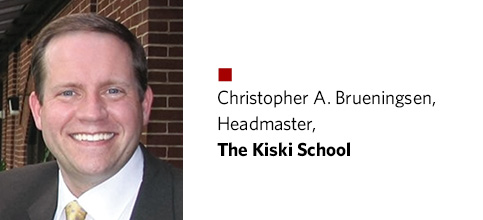
Christopher A. Brueningsen, Headmaster, The Kiski School
Engendering traits such as honesty, responsibility, and quality of character has always been a primary mission of boarding schools. In today’s ethically challenged world, boarding schools such as Kiski are more valuable and relevant than ever. Every facet of life at a boarding school – from meals, to classes, to athletics and time in the dormitory – is an opportunity for students to interact on their own terms with peers, teachers, and coaches. Boarding school students learn how to set goals for themselves, think for themselves, get along with others, accept responsibility, and be active participants in all they do. And because they learn these life lessons by living in a community under the supervision of expert adult educators, they also learn that dedication to others marks a true person of character. Our students’ faithful efforts in new courses, activities, and friendships and their kindness, generosity, honesty, and humor define the essential character of our school. In a time when making money seems to be more important than making a difference, schools such as Kiski can set an example for young men and women. Boarding schools instill a sense of pride and self-knowledge in their students that sets the wheels in motion for a life filled with honor, regard for others, and the pursuit of personal excellence.
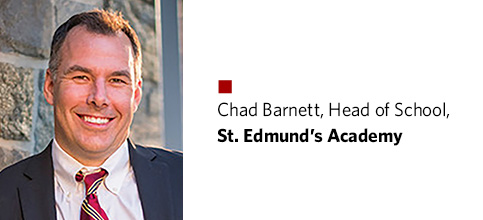
Chad Barnett, Head of School, St. Edmund’s Academy
At a time when technological networks have presented all of us—including children—with unprecedented access to all forms of information and to each other, a clear sense of our personal and collective sense of who we are and what we stand for feels important. While technology binds us together, it comes with no clear instruction manual on how to use those connections to lift each other up instead of tear each other down. As digital networks give rise to new modes of being and unprecedented forms of stress, and as the same networks complicate questions about personal identity and social responsibility on a larger scale, schools face a unique opportunity to help young people reimagine their sense of place and responsibility to others. In many respects, St. Edmund’s Academy has established itself as a refuge from these pressures, drawing on its history of character development, academic rigor, and community that has served the school for over 70 years. Qualities today seen as countercultural are fundamental to the St. Edmund’s Academy experience—respect for the needs and feelings of others, the worthiness of service to others, the importance of taking responsibility for one’s own conduct, the central role of honesty in relationships, understanding and appreciating the differences among people, the value of setting high standards in all endeavors. These core values provide the ties that bind our diverse community. As they navigate our wired world, facing endless options—fake and factual, real and virtual—they do so with a sense of purpose made possible by a school that stands unflinchingly for character partnered with families who want that experience for their children.
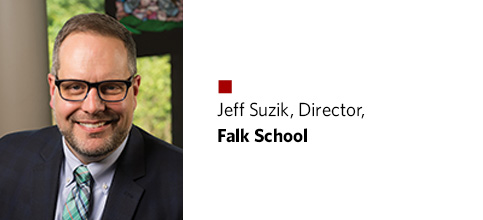
Jeff Suzik, Director, Falk School
At Falk, it is a long-standing priority to be as inclusive and welcoming a community as
possible. In the midst of what has been one of the most politically and socially
contentious moments in our nation’s history, it is undeniable that key aspects of our
multi-dimensional democratic society have eroded, things like kindness, respect, and
civility. The current climate has resulted in our having “doubled down” on our steadfast
devotion to our core sensibilities about community. What we have long known—both in
regards to our students and to ourselves—is that, more often than not, empathy
and sympathy for others cannot and does not come without first knowing, understanding,
and finally appreciating their situations and experiences. Hence, in almost everything we
do, whether it be an art project or analytic essay, a science lab or a class play, we work
hard to place that activity within the larger framework of healthy identity formation, not
just regarding who I am or who you are, but rather who we, together, can (and should) be.
That the continued existence of our civil society depends on it is something of which we
never lost sight.
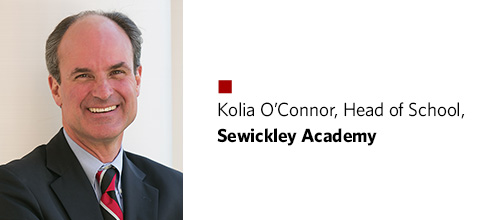
Kolia O’Connor, Head of School, Sewickley Academy
There is often a sense on the part of each generation that the next generation doesn’t quite measure up in terms of values and virtues. We’ve found, however, that our students are humble, honest, selfless, kind, and respectful. At Sewickley Academy, we align our practices with our mission – to inspire and educate students to engage their hearts, minds, and hands to cultivate their full individual and collective potential in the service of a greater good; and core values – character, educational vigor, diversity, and community – to foster a relationship-rich environment where our students are guided and empowered to reflect on and strengthen their skills for learning, leading, decision-making, and personal growth which includes our culture’s longstanding values and virtues. We don’t just hope we are creating an environment that promotes these values; we have taken steps to provide intentional instruction in these areas, beginning in our Pre-Kindergarten and continuing through Grade 12, with the Responsive Classroom and Developmental Designs programs in the Lower and Middle Schools, and our house system in the Senior School. Through these programs, students have a chance to learn and practice the values that will contribute to their overall success in life.

Katherine M. Titus, Head of School, Mercersburg Academy
Mercersburg has a long tradition of humility that dates back to its founding. The school finds a delicate balance between individual humility with strong collective pride. The selflessness, kindness, and respect of our students is deliberately cultivated and protected through our residential program and our family-style meals. With students from all corners of the United States and more than 45 different nations, it is essential that we create an environment where everyone has a place and their unique selves can be both supported and challenged as they develop. We expect our students to question but also to listen; to argue but also to respect; and to both challenge and understand. We create and sponsor trips abroad (to places as varied as South Africa, France, India, Chile, and Jordan) to expose our students to different perspectives and to the common humanity reflected in the cultures and life experiences of those from all around the world, and we sit together at meals to talk about our days and what is happening in the world, modeling our commitment to strong ideals and noble integrity.
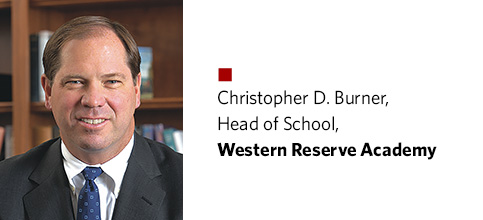
Christopher D. Burner, Head of School, Western Reserve Academy
Our school values of excellence, integrity and compassion are steadfast and guide everything we do. One of the most exciting things happening at WRA right now is the introduction of a new curriculum starting this school year. With the independent curriculum, we are the first school in the region to move beyond Advanced Placement courses, offering College Level courses that provide greater depth, flexibility and rigor. Another cornerstone of the new curriculum is an emphasis on cultivating life skills such as perseverance, self-efficacy, ideation and resilience. WRA students, over the course of their academic career, will develop this skillset naturally, but in answer to the growing emphasis on the importance of these capabilities, we are designing a new educational domain with special courses for every grade level, like our Digital Literacies for freshmen. Digital Literacies will equip all freshmen with an understanding of how to code, program, design and create with our makerspace, the Center for Technology, Innovation & Creativity, as the backdrop.
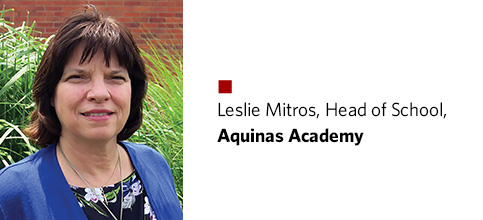
Leslie Mitros, Head of School, Aquinas Academy
There is no doubt that growth in virtue is a partnership between home and school. One way that we seek to develop growth in virtue for our students is through our Virtue of the Month. We have a two-year cycle of virtues that includes justice, kindness, charity, honesty, humility, industriousness, and modesty – among others. Those virtues are highlighted in various ways at the different grade levels. In the lower school, teachers use a virtue program called “Disciples of Christ” to help students identify and practice the virtues. In the middle and upper school, there is a monthly virtue calendar with various quotes from the saints, Church documents, as well as historical figures and great philosophers to help develop a multi-faceted understanding of the virtues. There are opportunities throughout the year for parents to hear speakers address the challenges of parenting and help students to grow in virtue.
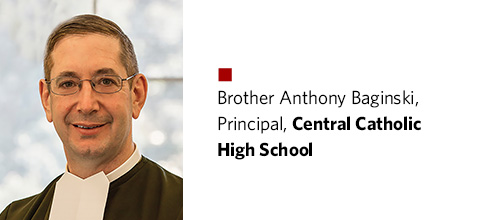
Brother Anthony Baginski, Principal, Central Catholic High School
Central Catholic graduates young men of faith and integrity to become leaders in our society. Humility, honesty, selflessness, kindness and respect are virtues that directly align with our school’s mission to develop, “Men of Faith, Scholarship and Service.” Every school day begins with a prayer, every class period begins with a short reflection to remember God’s presence and every teachable moment is closely examined to encourage students to internalize each decision they make. Retreats and days of recollection are integral components to the development of our young men. Our beliefs are a call to action for each student to live a moral life with an emphasis on honesty, discipline and the dignity of the individual from conception to natural death. Our beliefs are also a call to action to help others as shown though our Thanksgiving food drive for the Little Sisters of the Poor, our Lenten mission drive to assist students in other countries with their educational needs, service projects organized through Lasallian ministry and our sports teams, and service/immersion trips. Our belief that we are made in the image and likeness of God demands that we put into practice those values of charity, respect, selflessness, and honesty.
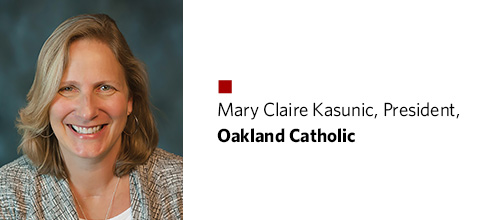
Mary Claire Kasunic, President of Oakland Catholic
Oakland Catholic High School is very mission-driven, with a goal of educating young women to become competent, responsible, and ethical global leaders. The tenets of Spirituality, Scholarship, and Service are the foundational pillars of our mission, and the model of “leader as servant” is inherent to our Catholic tradition, so I can honestly say that the attributes of humility, selflessness, kindness, respect, and honesty are integral aspects of the Oakland Catholic educational experience. These values are not compartmentalized to Religion classes or a Code of Conduct; they are manifested in both words and actions as students participate in mission/service trips here in Pittsburgh as well as in NYC, DC, Jamaica, and Guatemala. They are expressed in the countless volunteer hours accumulated by OC students at local institutions such as the Boys & Girls Club, Bethlehem Shelter, or Family House, and at individual churches and communities across four counties. They are emphasized in retreats, the Christian Athletes’ group, and the Black Student Union. The importance of the dignity of life from conception until natural death, and at all points in between, is inextricable from Catholic doctrine, and therefore demands the ongoing presence of values and virtues like respect, charity, humility, and selflessness.




